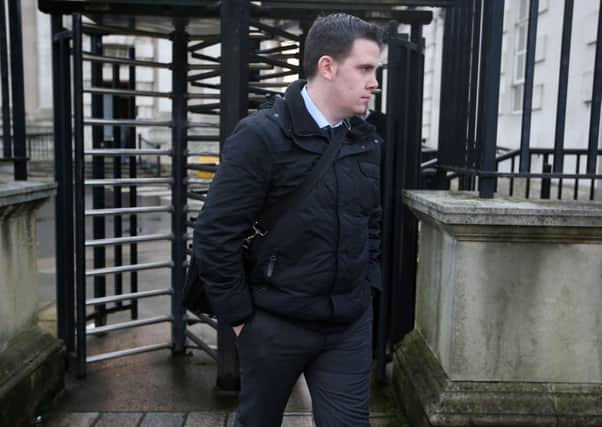Flanagan may have been negligent - but insurer should pay libel bill, court told


The Fermanagh politician, who last month admitted to seriously libelling the Ulster Unionist MP and publicly apologised to him, today concluded his legal case against the Assembly’s former insurance company in a bid to get them to pay the almost £50,000 in damages and unknown legal costs awarded against him.
Much of today’s hearing focussed on legal arguments about the wording of the contract and insurance case law.
Advertisement
Hide AdAdvertisement
Hide AdMr Flanagan’s barrister, Martin McDonnell, accepted that his client “might have been careless or negligent” in sending the tweet, but insisted that his actions “fell short” of the defence contention that he knew it was defamatory.
But Robert Millar for the defence argued that “if he pushes the button [to tweet], that’s his problem...he has to face the consequences”.
Mr McDonnell also took issue with the insurer’s change of stance over the course of Mr Flanagan’s dealings with it.
Initially, AIG refused to indemnify the MLA because it said that Assembly members could not sue each other for libel under the terms of the policy.
Advertisement
Hide AdAdvertisement
Hide AdMr McDonnell drew attention to the fact that the insurer had given “substantial consideration” to the issue and consulted an expert in insurance law before communicating its decision to the Sinn Fein MLA.
However, that contention has now been abandoned by the defence, which is instead relying on other factors, among them Mr Flanagan’s failure to notify the company immediately when he received a solicitor’s letter from Mr Elliott’s lawyers.
Mr McDonnell contended that “the attitude of the insurance company at the time they are refusing to indemnify [Mr Flanagan] is relevant”.
At no time, he said, had there been a notification from the company that if it was wrong about the point that MLAs cannot sue MLAs under the policy then it would not indemnify Mr Flanagan on other grounds.
Advertisement
Hide AdAdvertisement
Hide AdThe judge, Mr Justice Stephens, asked Mr McDonnell for his view on a claim by the insurer in the policy that it provided a “transparent” service to its customers. Mr Flanagan’s lawyer said that meant that it should have given him a fuller explanation as to why it was refusing to cover him.
Mr Flanagan had tweeted “Tom Elliott speaks to Stephen Nolan about the past. I wonder if he will reveal how many people he harassed or shot as a member of the UDR.”
However, he has already accepted that the message was seriously defamatory of Mr Elliott, has not sought to justify what he said and has publicly apologise to his Ulster Unionist rival.
Mr McDonnell argued that the tweet had to be seen “in the context” in which it had been sent, where Mr Flanagan had been travelling to Stormont in his car and listening to a debate about the Troubles on the Nolan Show. Mr McDonnell said of his client: “His view was that matters had been aired which required counter balance.”
Advertisement
Hide AdAdvertisement
Hide AdMr Millar accepted that the original grounds given by the insurer for refusing to cover Mr Flanagan were “unsustainable” and that it has since put forward other grounds for why it should not pay out.
But he went on: “In my submission, there’s nothing at all strange about that”.
And, arguing that the MLA had acted without due care, he said: “There has never been any suggestion by Mr Flanagan that he had a scintilla of evidence” that there had been wrongdoing by Mr Elliott.
And, rejecting Mr Flanagan’s contention that he did not understand that what he was tweeting was defamatory, Mr Millar told the judge: “In my submission, he is an intelligent and articulate man...in terms of how he came across in the witness box.”
Advertisement
Hide AdAdvertisement
Hide AdMr Millar said it was “self-serving” and “quite incredible” for Mr Flanagan to say that he was ignorant of the seriousness of what he was alleging.
The barrister also argued that the policy only covered MLAs in relation to their parliamentary or constituency business, adding that it would be “stretching things” to say that “sending a tweet in the [Stormont] car park” fell into either category.
He argued that it had been an “absolutely ridiculous” message and that “the more ridiculous” the tweet, the harder it would be for the court to decide that it was either parliamentary or constituency activity.
Mr Justice Stephens reserved judgement in the case, saying that he will give his verdict “as soon as I can, given the other commitments that I have”.
Advertisement
Hide AdAdvertisement
Hide AdIf Mr Flanagan does win the case, there is an excess of £25,000 which would have to be paid on any claim.
It was not clear during the proceedings whether that would have to be paid by taxpayers, via the Assembly, or whether it would have to be paid by Mr Flanagan.